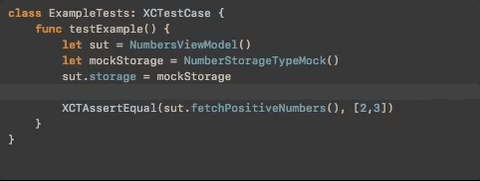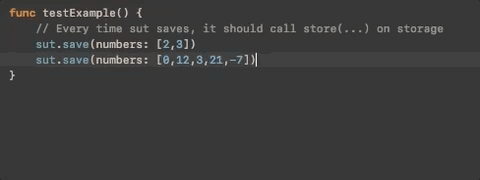Check out guides, or full documentation
SwiftyMocky is a strongly typed framework for Mockito-like unit testing experience. Library depends on Sourcery, that scans your source code and generates Mocks Swift code for you!
The idea of SwiftyMocky is to automatically mock Swift protocols and protocol compositions. The main features are:
- easy syntax, utilising full power of auto-complete, which makes writing test easier and faster
- we DO support generics
- mock implementations generation
- a way to specify what mock will return (given)
- possibility to specify different return values for different attributes
- record stubbed return values sequence
- verify, whether a method was called on mock or not
- check method invocations with specified attributes
- it works with real device
CLI was moved bask to the main (this) repo. CLI in this repository will be supported at least until version 5.0.0.
Current version has several significant changes. It removes deprecated methods (which might be breaking) and deprecates having CLI in the new repository.
SwiftyPrototype was also extracted to separate library. There are no more compilation flags, so if you were relying on SwiftyMocky with -DMockyCustom, you will have to switch to SwiftyPrototype.
We consider current version as stable. We are moving toward using the new Mockfile but the previous configuration format would be still supported. Library works with Swift 4.1, 4.2, 5.0, 5.1.2 and Sourcery 1.0.x.
While it is technically possible to integrate SwiftyMocky on Linux targets, there is no Mock generation feature there yet. You can use SwiftyMokcy runtime via SwiftPM though, as long as your are fine with generating mocks on mac machine.
The migration is not required, you can keep using SwiftyMocky as you did before. The Legacy setup is described in guides section.
Still, we would encourage to try new CLI and share a feedback. We believe it will make using and setting up SwiftyMocky way easier. If you have an existing setup, install CLI as per this guide and try:
> swiftymocky migrateSwiftyMocky is available through CocoaPods. To install it, simply add the following line to your Podfile:
pod "SwiftyMocky"Use CLI tool from your project directory:
# To setup initial Mockfile
% ./Pods/SwiftyMocky/bin/swiftymocky setup
# To generate mocks
% ./Pods/SwiftyMocky/bin/swiftymocky generateTo install, add following to you Cartfile:
github "MakeAWishFoundation/SwiftyMocky"Then execute carthage update
For Carthage, few additional steps are required
You need to install CLI to generate mocks - see installation
Add SwiftyMocky to you Package.swift dependencies:
dependencies: [
.package(url: "https://github.com/MakeAWishFoundation/SwiftyMocky", from: "4.2.0"),
]You need to install CLI to generate mocks - see installation
Note: Examples of SwiftyMocky integration as a tool for Unit tests, as well as a Prototyping framework, are here: https://github.com/MakeAWishFoundation/SM-Integration-Tests
> brew install mint
> mint install MakeAWishFoundation/SwiftyMocky> marathon install MakeAWishFoundation/SwiftyMockyMake:
Clone from https://github.com/MakeAWishFoundation/SwiftyMockyCLI and run make in the root directory.
Annotate your protocols that are going to be mocked, making them adopt AutoMockable protocol, or adding annotation comment above their definition in the source code.
Mocks are generated from your project root directory, based on configuration inside Mockfile.
> path/to/swiftymocky setup # if you don't have a Mockfile yet
> path/to/swiftymocky doctor # validate your setup
> path/to/swiftymocky generate # generate mocksMore informations about CLI and mock generation
If you don't want to migrate to our CLI and prefer to use "raw" Sourcery, please refer to this section in documentation.
Create 'dummy' protocol somewhere in your project, like: protocol AutoMockable { }
Adopt it by every protocol you want to actually mock.
protocol ToBeMocked: AutoMockable {
// ...
}Alternatively, mark protocols that are meant to be mocked with sourcery annotation as following:
//sourcery: AutoMockable
protocol ToBeMocked {
// ...
}Or use it to protocol compositions:
typealias ToBeMocked = OneProtocol & TwoProtocols & AutoMockableEvery protocol in source directories, having this annotation, will be added to Mock.generated.swift
All mocks has given method (accessible both as instance method or global function), with easy to use syntax, allowing to specify what should be return values for given methods (based on specified attributes).
All protocol methods are nicely put into Given, with matching signature. That allows to use auto-complete (just type .) to see all mocked protocol methods, and specify return value for them.
All method attributes are wrapped as Parameter enum, allowing to choose between any and value, giving great flexibility to mock behaviour. Please consider following:
Given(mock, .surname(for name: .value("Johnny"), willReturn: "Bravo"))
Given(mock, .surname(for name: .any, willReturn: "Kowalsky"))
print(mock.surname(for: "Johny")) // Bravo
print(mock.surname(for: "Mathew")) // Kowalsky
print(mock.surname(for: "Joanna")) // KowalskyIn verions 3.0 we introduced sequences and policies for better control of mock behvaiour.
Given(mock, .surname(for name: .any, willReturn: "Bravo", "Kowalsky", "Nguyen"))
print(mock.surname(for: "Johny")) // Bravo
print(mock.surname(for: "Johny")) // Kowalsky
print(mock.surname(for: "Johny")) // Nguyen
print(mock.surname(for: "Johny")) // and again Bravo
// ...For more details please see full documentation.
All mocks has verify method (accessible both as instance method or global function), with easy to use syntax, allowing to verify, whether a method was called on mock, and how many times. It also provides convenient way to specify, whether method attributes matters (and which ones).
All protocol methods are nicely put into Verify, with matching signature. That allows to use auto-complete (just type .) to see all mocked protocol methods, and specify which one we want to verify.
All method attributes are wrapped as Parameter enum, allowing to choose between any, value and matching, giving great flexibility to tests. Please consider following:
// inject mock to sut. Every time sut saves user data, it should trigger storage storeUser method
sut.usersStorage = mockStorage
sut.saveUser(name: "Johny", surname: "Bravo")
sut.saveUser(name: "Johny", surname: "Cage")
sut.saveUser(name: "Jon", surname: "Snow")
// check if Jon Snow was stored at least one time
Verify(mockStorage, .storeUser(name: .value("Jon"), surname: .value("Snow")))
// storeUser method should be triggered 3 times in total, regardless of attributes values
Verify(mockStorage, 3, .storeUser(name: .any, surname: .any))
// storeUser method should be triggered 2 times with name Johny
Verify(mockStorage, 2, .storeUser(name: .value("Johny"), surname: .any))
// storeUser method should be triggered at least 2 times with name longer than 3
Verify(mockStorage, .moreOrEqual(to: 2), .storeUser(name: .matching({ $0.count > 3 }), surname: .any))For Verify, you can use Count to specify how many times you expect something to be triggered. Count can be defined as explicit value, like 1,2,... or in more descriptive and flexible way, like .never, more(than: 1), etc.
From SwiftyMocky 3.0, it is possible to use Given and perform Verify on properties as well, with respect to whether it is get or set:
mock.name = "Danny"
mock.name = "Joanna"
print(mock.name)
// Verify getter:
Verify(mock, 1, .name)
// Verify setter:
Verify(mock, 2, .name(set: .any))
Verify(mock, 1, .name(set: .value("Danny")))
Verify(mock, .never, .name(set: .value("Bishop")))All mocks has perform method (accessible both as instance method or global function), with easy to use syntax, allowing to specify closure, that will be executed upon stubbed method being called.
It uses same parameter wrapping features as given, so you can specify different Perform cases for different attributes set.
It's very handy when working with completion block based approach.
Example:
// Perform allows to execute given closure, with all the method parameters, as soon as it is being called
Perform(mock, .methodThatTakesCompletionBlock(completion: .any, perform: { completion in
completion(true,nil)
}))Full documentation is available here, as well as through docs directory.
Guides - Table of contents
Changelog is available here
For list all supported features, check documentation here or guides
For more examples, check out our example project, or examples section in guides.
To run the example project, clone the repo, and run pod install from the Example directory first.
To trigger mocks generation, run rake mock or swiftymocky generate from root directory (if you installed CLI).
- stubbing protocols in elegant way
- template for generating mocks
- example project
- stubbing protocols with variables
- method signature generation without name conflicts
- cover 95% of framework codebase with unit tests
- cover 95% of framework codebase with documentation
- add unit tests for template
- support for tvOS, Linux and MacOS
- Carthage support
- Subscripts support
- Stub return values as sequences
- Simple tool simplifying configuration process
- Przemysław Wośko, wosko.przemyslaw@gmail.com
- Andrzej Michnia, amichnia@gmail.com
SwiftyMocky is available under the MIT license. See the LICENSE file for more info.







